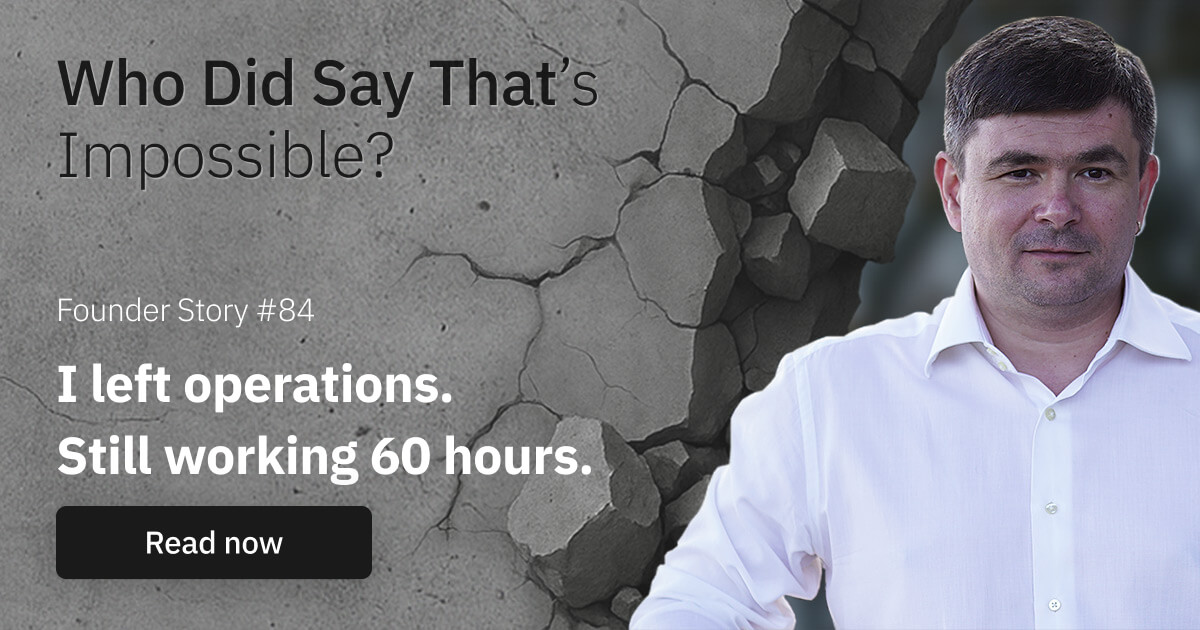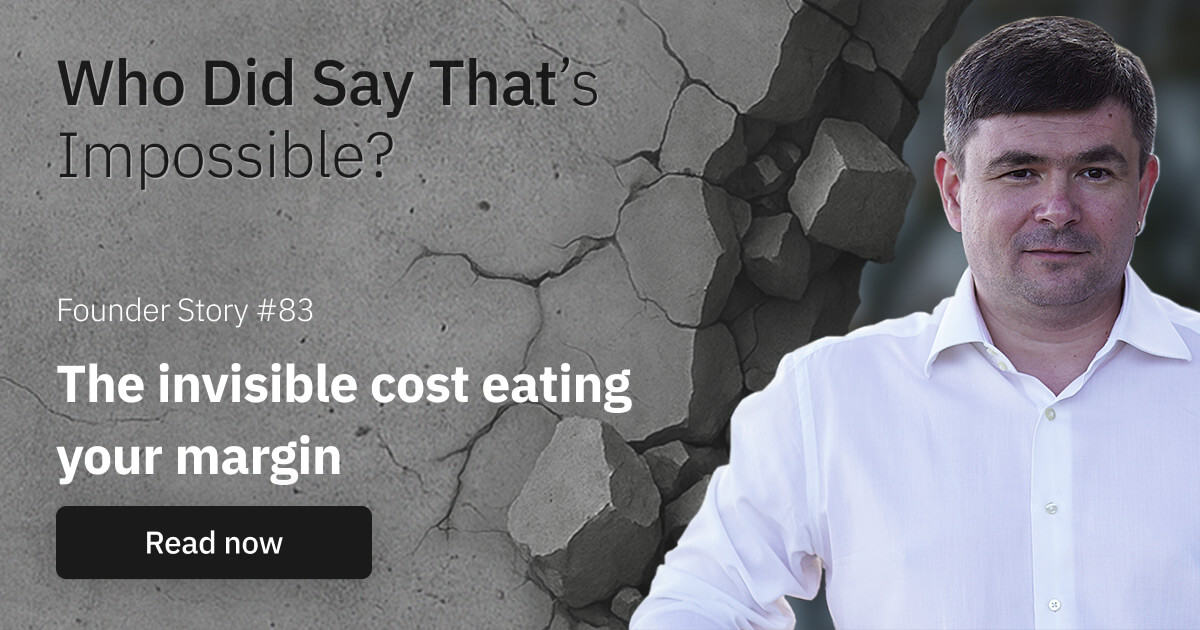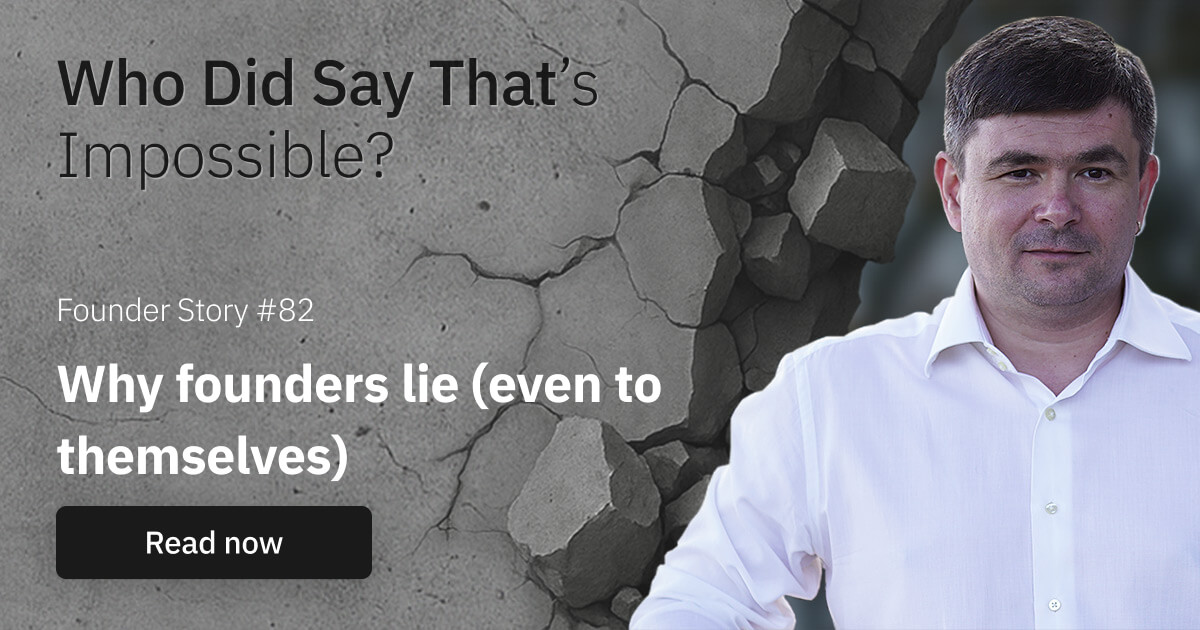The question game. An underrated entrepreneurial skill.
Or a minute on the hunt for answers.
Psychologists describe the crises people face throughout life.
Midlife crisis, other joys.
But I’m not about to discuss the crises themselves or their origins.
I’m want to talk about what comes with them—questions.
Questions about your purpose, your life, your impact, why any of it matters, and so on.
Sure, some people never bother with this stuff—“What questions? We’re alive, aren’t we? What more do you need?”
King Solomon’s “with much wisdom comes much sorrow” comes to mind.
In the original, it’s phrased differently and refers to something else (sort of), but the idea is clear.
Knowledge brings, at the very least, unease to those seeking answers—and to those close to them.
It’s no wonder so many avoid the heaviness of deep contemplation.
But here’s what’s interesting.
Nearly all entrepreneurs, from rookies to the most successful, share one trait.
They are made of questions.
They radiate an insatiable curiosity, a burning desire to explore.
With one caveat—this isn’t the kind of exploration scientists do to understand the universe.
Entrepreneurs are deeply practical by nature. Their questions and the answers they chase are all about utility—how to use these insights to benefit people.
And, ideally, make money doing it.
Side note.
Some would call them cynics.
Maybe they are.
But let’s be honest—life itself is pretty damn cynical.
People who live in a bubble of delusion don’t last long.
Reality tends to be a harsh wake-up call.
Curiosity, that “explorer’s spirit,” is what sets entrepreneurs apart.
Their practical approach turns curiosity into a sort of Lego game:
- What happens if I plug this in here?
- What the hell is this thing?
- And what does it even do?
- How do these pieces fit?
- What else can I build?
An endless stream of questions.
And with every answer comes even more questions.
True entrepreneurs never stop at the answers they’ve got. Their curiosity drives them forward.
Every answer is just a starting point, opening new horizons and sparking new questions.
But the biggest, perhaps unconscious, question is—Can I do this?
It’s a journey of self-discovery.
Exploring their own limits, their ability to reach goals and bring dreams to life.
Entrepreneurs ask questions with a purpose—to find practical applications.
And to get practical answers, you need to ask the right questions.
“A well-asked question is half the answer,” they say.
Being the practical folks they are, entrepreneurs have come up with different methods to ask these right questions. There are plenty, for various purposes.
Here are a few I use that help me reach my goals.
Goal Decomposition
Breaks down the path to your goal into smaller, manageable tasks.
The biggest advantage? You can tackle huge, complex goals without feeling overwhelmed.
You can drill down as deep as needed, right to a daily to-do list of specific tasks.
Great for visualizing long-term plans, showing task dependencies clearly.
Think of it like a roadmap with all connections laid out.

Reverse Engineering
Perfect for when you have an example to aspire to but no clue how to get there.
You dive deep (and it’s no easy task) into understanding the processes of that admired business:
- Follow their social media and subscribe to their content,
- Make a purchase to see the service or product flow,
- Analyze their marketing, visuals, and strategies,
- Understand how they deliver value,
- Break down their unit economics,
- Study client communication.
Sometimes this is straightforward, as founders often share their methods (though not all their secrets).
It’s time-consuming research task but rewarding beyond just creating a plan—providing knowledge across related areas.

Cutting the Unnecessary
Inspired by Occam’s Razor, this method evaluates what’s unneeded in your business.
Take, for example, a local cleaning service looking to scale regionally.
What should be cut?
- The founder personally handling on-site service estimates,
- Dependency on a fixed location for supplies,
- Localized content,
- Reliance on one local supplier.
Removing what holds you back is key to moving forward.
Inversion
This is perhaps the most contrarian method.
Instead of asking what you want, consider what you don’t want and work backward to avoid it.
Example:
Instead of “I want more profit,” look at it from the opposite angle: “I don’t want high expenses.”
Since profit is revenue minus expenses, you can:
- Increase revenue, or
- Reducing costs, like automating tasks with AI.
Different angles lead to different strategies.
These methods can be used solo or in combinations that suit your needs.
In entrepreneurship, answers are rarely obvious.
Often, an answer is a puzzle made of many pieces, and your job is to fit them together, figure out what’s missing, and refine as you go.
Even simple questions can take time.
Be patient.
But most importantly.
Never stop moving forward.
Don’t be afraid to ask new questions.
Don’t be afraid to hear shocking answers.
Don’t be afraid to see that there’s a whole new world beyond the horizon you never even imagined.
Fear only the comfort of staying still.
———
If you want to know more about other mess-ups and lessons on my entrepreneurial journey — subscribe to Eugene’s Stories.
See you soon!
- Eugene
- Eugene
Join the founders learning how to build without burning out.

Hi, I’m Eugene.
No clients. No savings.
A laptop in the bedroom and a promise to my wife that this would be worth it.
20 years later — 80 people, 3 continents, 7-figure revenue.
But for many years, I was the bottleneck in my own business.
Now I help founders escape the same trap. Through systems that actually work, not theory.
I write weekly: operational war stories, decision systems, and lessons learned the hard way.
For founders who want to build without burning out.
More Stories
Founder Stories

I left operations. Still working 60 hours.
Or minute of realizing freedom doesn't mean what you think

The invisible cost eating your margin
Or minute of realizing you're paying for time you can't bill


